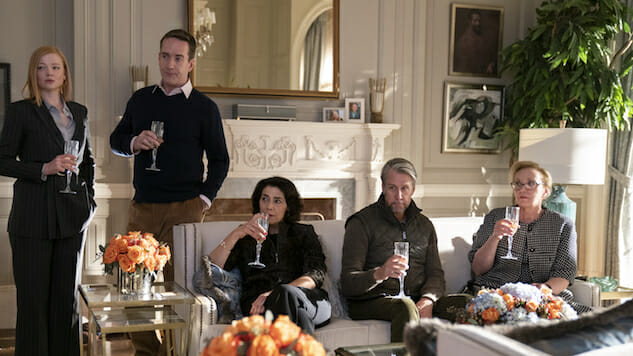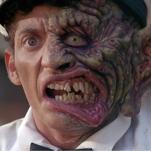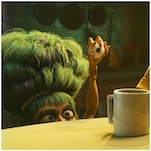Succession’s Story Might Be Shakespearean, but Its Characters Are Pure Jane Austen
Photo Courtesy of HBO
The Roy family references Shakespeare, consciously or unconsciously, quite a lot. Sure, words aren’t wind, they’re “complicated airflow,” and the Roys don’t exactly carry pocket versions of the First Folio around with them. (“I land the deal, I kill Kendall, I’m crowned king. Just like in Hamlet,” Kieran Culkin’s Roman plots in this week’s episode. He then preempts a correction from Tabitha by adding, “If that happens in Hamlet. I don’t care.” And he doesn’t care, because he’s describing Macbeth.) Still, ultimately, the play’s the thing, and the scope here is tragic. Not just for the characters, almost all of whom are broken or tortured—even Roman and Greg, the intentional and unintentional clowns of the ensemble, are wounded or in danger in some way—but also for the world at large. Kendall kills Vaulter, and it’s a massive blow to the people who work there and the free press. Shiv blackmails her father into drawing Gil Eavis into his web, and it’s bad news for the relationships and the republic as a whole. They live in the winters of their discontents; they cry havoc and let slip the dogs of war; they feel what is sharper than a serpent’s tooth. But the evil that men do lives after them, and it’s the rest of the world that gets truly fucked.
As such, perhaps it’s appropriate that Succession is nominated in the best drama series category for the 2019 Emmys. (It’s also nominated for awards in the direction, casting, main title music, and writing categories—and to be fair, the episode nominated for writing, “Nobody Is Ever Missing,” is the most traditionally tragic of the bunch.) It’s an hour long, it’s got that whole King Lear thing going, but if forced to pick a lane then Succession isn’t a tragedy, it’s a comedy. It’s a mean comedy, with its roots in the foibles and fixations of the very wealthy and those who’d like to be. And that’s Shakespeare sometimes, but it’s Jane Austen all the time. Jane might not have dreamed up anything quite as mean as Boar on the Floor in her lifetime—the “game” and exercise in humiliation dreamed up by Logan in “Hunting”—but it’s not hard to imagine, and that’s because Jane definitely knew men like Tom Wamsgans (played by Austen veteran Matthew Macfadyen).
Sometimes people who aren’t actually familiar with Austen’s work assume it’s stuffy or stiff or (most infuriatingly) slight, presumably because it’s “chick lit.” A few years ago I sat down with a friend who’d never read Austen, or even seen an adaptation (give or take a Clueless), and we watched Andrew Davies’ 1995 Pride And Prejudice miniseries. At the beginning of the second episode, when David Bamber’s Mr. Collins showed up, he paused it and said, “Wait, is it supposed to be this funny?” Lizzie Bennet’s bon mots and Mrs. Bennet’s endless foolishness were definitely funny, but within a framework he expected; essentially, that of the romantic comedy. But Bamber’s moon-faced oddity, with his equal parts obsequiousness and self-satisfaction and his painful lack of self-awareness, is the character who made Austen’s social satire plain. Somewhere in there might be a sensible person, but his pride at being adjacent to power and wealth (the many windows of Rosings Park; the condescension of Miss de Bourgh, who deigns to ride past his house in her phaeton; the list goes on) makes him utterly ridiculous, lacking in sense, dignity, and any social grace.
The rich, in Austen’s work, are as susceptible to being ridiculous as the striving social climbers, but the Mr. Collins’ of her world are particularly weak and, as such, particularly funny. And that’s Tom Wamsgans. The heroines (and occasional heroes) of Austen have flaws, but when they make mistakes because of those flaws, they learn and change. It’s those blind to or unwilling to work at improving on their flaws who earn her ire. That’s where the tragedy and comedy meet in Succession: In the spectacle of people falling all over themselves to prove how simultaneously worthy of praise and deferential they are.
The two go hand in hand when ones plays Boar on the Floor. You have to be cool with it. You have to be willing to grovel, while making it clear that it’s no big deal that you’re groveling. You are above and beneath it, all at once. That’s the deal. You want the access, no half-hearted oinks. Mr. Collins would one-hundred percent play Boar on the Floor, and gladly. He would thank you for the honor. The difference between Mr. Collins and Tom Wamsgans is that Tom will oink, but he knows what that means. He’ll oink, but there’s a line he won’t cross. (Miracle of miracles, that line is Greg.)
Jane Austen is social satire, but the people aren’t sketches. The same is true of Succession. In Northanger Abbey, the novel of Austen’s that’s the most purely satirical, Catherine Moreland learns and grows throughout her journey. She imagines great, gothic horrors, but encounters everyday ones with some frequency. The greatest horror, greater even than her rough treatment at the hands of General Tilney, is the shame and humiliation she feels when confronted by her own foolishness. Mr. Darcy’s evolution in Pride and Prejudice is affecting. Elinor Dashwood’s dignity in Sense and Sensibilty is inspiring. The wounds the titular Emma Woodhouse inflicts sting. But that does not make more minor characters Mrs. Bennet, Charlotte Palmer, and the Eltons any less ridiculous. In Succession, often the Palmers and Dashwoods are one and the same.
Case in point: The Roys as Bennet sisters.
Shiv Roy – Elizabeth Bennet. Shiv has essentially thrown off a lot of Lizzie’s more likable qualities (also very Shakespearan, some real Viola shit—only it’s not a disguise, it’s a way of navigating the world). But she’s the smartest of them, the most self-aware, the most practical, and the most likely to push back against what the family says she’s supposed to do. Hilariously, this Lizzie marries Mr. Collins, but it’s not because her family wants her to do so.
Roman Roy – Lydia and Kitty Bennet. Romulus has Lydia’s fuck-all impulsiveness and sense of rebellion. He’s the fun one, even when it makes him insufferable (and Lydia is insufferable). He’s got terrible judgment a lot of the time and is desperate to prove himself because he likes how that makes him feel (like Lydia’s need to flirt, only here it’s Rome’s need to launch a rocket super fast). But he also has Kitty’s poutiness and jealousy, as well as her potential. Kitty thrives when she’s given some distance from her sister, which I guess means that Roman needs a very good therapist, ASAP.
Kendall Roy – Jane Bennet. Now, hear me out. Kendall was the good sister, but also kind of the weak sister. In that regard, he’s Fanny Price, who at one point in Mansfield Park lays down on a couch and everyone in the room forgets that she, the heroine of the book, is even there. Perhaps it’s appropriate to say that Kendall begins as a Jane, albeit a Jane who thinks he’s a Lizzie, only instead of her sweetness being rewarded by her one true love returning to Netherfield Park at last, he kills a waiter in his car when he’s high as hell and then gets turned into a mud treatment-craving, publication-killing Fanny, who will absolutely fetch your slippers and walk to the garden in the mud because he just doesn’t have the will to do anything else. Jane is also the babe of the group, which is part of why you have a secret crush on him.
Connor Roy – Mary Bennet. Mary would give you sourdough starter for your birthday even though she knows you won’t use it. Mary would throw a fit at the Sad Sack Wasp Trap, probably because she’s not allowed to play too many sad songs in a row. Mary would hate income tax and brag about having all the water. Just imagine, pray, if Mary Bennet ran for President.
If Tom Wamsgans is one of the great Austen archetypes (plus a little extra tragedy, thanks to a little self-awareness), then we should be prepared for others. There are traces, here and there: Logan is a total Lady Catherine de Bourgh, only much smarter; all the Roy employees, but Gerri in particular, are the intelligent sycophants that surround families like the Roys, such as the solicitor in Persuasion who has to trick the foolish Sir Walter Elliott into thinking he came up with the idea to rent out his house so that they there’s still money to pay his salary. But there’s one major Austen archetype we only glimpse in flashes, and it’s that archetype that’s perhaps key to the future for the Roys: That would be Miss Lucy Steele, and her ilk.
Marcia (Hiam Abbass) doesn’t always say much—though she does give Shiv an epic telling-off at the end of Season One. She’s constantly suspected by her husband’s children of being a money-grubbing, predatory social climber, out to corner more and more of the Roy family fortune. In Sense and Sensibility, the shallow and foolish Mrs. John Dashwood believes that her brother’s sisters, the sensible Elinor in particular, are the real threats, viewing the mild-mannered, ingratiating Lucy as an ally nearly all the while. (In the 1995 Emma Thompson/Ang Lee film adaptation, Mrs. John Dashwood is played by Harriet Walter, who also plays Roy siblings’ mother Lady Caroline—a character who, with a little less cursing, could actually exist in an Austen novel.) Lucy is a threat because she knows how to kiss ass without appearing to do so; she’s almost always the smartest person in the room, and pairs shamelessness with a ruthlessness which keeps her from having to be fully shameless.
Lucy outmaneuvers everyone, leaving behind one brother (who gets himself disowned for her), for the brother who then stands to inherit the fortune, and eventually even wins over that family’s nightmarish matriarch. Elinor is the only person who actually sees what Lucy’s doing, and she’s powerless to do anything about it. If Tom Wamsgans is Mr. Collins with some tragic self-awareness, then perhaps Marcia is Lucy, albeit with more dignity and subtlety. What is Lucy Steele wasn’t the villain? What if she was just the smart one? While Tom and Greg oink and the Roys do battle to be the number-one boy, Marcia observes, moves quietly, and never cedes ground.
Marcia will never, ever have to play Boar on the Floor.
I’m not the first to argue that Succession is a comedy. (It is a comedy. It’s also a tragedy. Such is life.) But I do think it’s worth considering the gap between the story the Roys think they’re in, and the story we’re watching. It’s the tension between Kendall sitting in silent, numbed misery, his eyes twin pools of despair, and his pitiful request moments later that he be allowed to continue with his mud treatment. It’s the guy who prepares to piss in a wine-chiller, then minutes later shrieks with glee at Boar on the Floor, just grateful to not be eating that sausage. And it’s the watch that tells you how rich you are, given away to the groundskeeper’s kid as hush money. But here’s the good news for the Roys: tragedies end with body counts. Comedies don’t. If the characters evolve, they get a happy ending.

So … maybe we’re headed for a body count after all.
Succession airs Sunday nights on HBO.
Allison Shoemaker is a TV and film critic whose work has appeared in The A.V. Club, Vulture, RogerEbert.com, and other publications. She is also the co-host of the podcasts Hall Of Faces and Podlander Drunkcast: An Outlander Podcast, the latter of which is exactly what it sounds like.







































